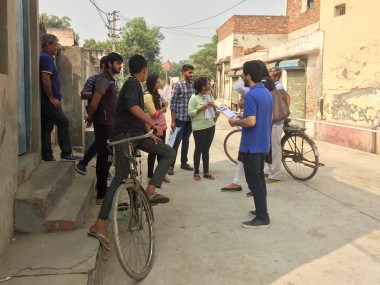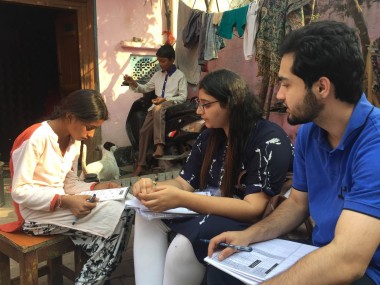After years of work, ASER Beyond Basics is now live. The tools are finalized, the partnerships settled, and the survey booklets printed. The ASER Centre office in Delhi is nearly empty. The central and the state teams have been deployed to train volunteers, monitor the survey, and perform the data control activities necessary to ensure quality implementation in 29 districts across India.
ASER is fascinating because, among other features, it is a citizen-led survey. The survey is designed in the central office but data collection is done by volunteers managed and monitored by the ASER central and state teams. These volunteers gain first-hand exposure to the reality faced by diverse populations and gain practical experience in the field. For the central team, volunteers are an essentially ally. The scale of ASER would not be possible without their participation.
Successful implementation and enumerator management requires an outstanding planning and training process. Members of the central and state teams were trained to be the critical link between the Assessment Unit in ASER and the volunteers. Due to the complexity of the survey and the procedures, the preparations were thorough. Manuals were developed and training tools designed.

ASER team members working as trainers then spent hours with the volunteers both in classrooms and in the field to master the content and ensure a quality survey process. Trainers are in charge of conveying technical knowledge, training on correct procedures, and conveying the motivation and importance behind ASER’s work.
I was part of Haryana’s implementation of Beyond Basics. The partner university for the first stage was Jindal Global University. Due to academic calendar constraints, the training was packed into a few intense sessions. We covered procedures, practices in the field, and tried to motivate the volunteers to also take a personal interest in the quality of their work. Since the target age group for the survey is 14-18, and personal questions are asked, an important aspect of the training was to emphasize building trust and being sensitive.
 On the first weekend of November, early in the morning, the volunteers and monitors were distributed across the selected district in Haryana and spent the full day visiting households and interacting with the local community.It was impressive to see the results that a detailed training plan and motivated trainers can achieve in only a few days. With the help of ASER trainers, the volunteers could follow the procedures as they were taught. Mapping, sampling, and surveying processes were followed with precision. Volunteers reached a balance between collecting quality data and interacting sensitively with the youth.
On the first weekend of November, early in the morning, the volunteers and monitors were distributed across the selected district in Haryana and spent the full day visiting households and interacting with the local community.It was impressive to see the results that a detailed training plan and motivated trainers can achieve in only a few days. With the help of ASER trainers, the volunteers could follow the procedures as they were taught. Mapping, sampling, and surveying processes were followed with precision. Volunteers reached a balance between collecting quality data and interacting sensitively with the youth.
At the same time that my group was on the ground in Haryana, many other groups in many other states were doing the same. Similar efforts are being followed in 28 other locations. Different monitors, different volunteers, different villages, but the same objective: collect quality data on India’s next adults.
India has around a crore of youth between the ages of 14 and 18. However, information on their abilities, aspirations, awareness and activities are limited. Beyond Basics, through its volunteers and ASER team members, is building a more complete understanding of this massive segment of the population. With a more complete understanding of this population, we can build smarter policies grounded in quantifiable realities and better enable future generations to reach their full potential.







